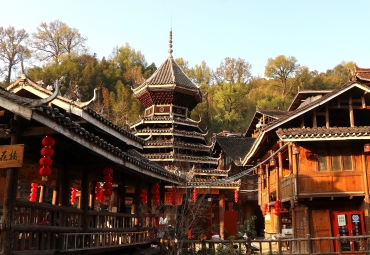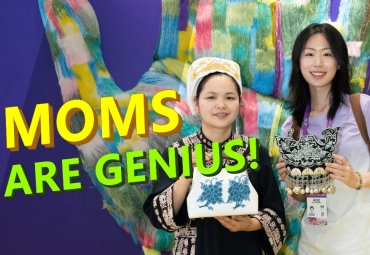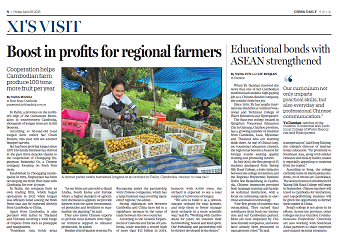Village life revitalized through rural initiatives

Farmers pick tomatoes at a plantation in Guiyang. WANG MINGYUAN/FOR CHINA DAILY
As spring approaches, the rural landscape in Guiyang, Guizhou province, is coming back to life with sightseeing tours, ethnic-style farmstays and fruit-picking activities favored by numerous visitors across the country.
In recent years, the city has vigorously implemented the rural revitalization plan to help farmers increase their income and promote balanced urban and rural development, which lays a solid foundation for achieving common prosperity and answers the call to the State Council's recently released document titled Opinions on Supporting Guizhou in Breaking a New Road in the Development of the Western Regions in the New Era.
Today, the villages of Guiyang show a new pattern of continuous development of the agricultural industry, improvement of farmers' lives and rural appearance.
Wengjing village, in Jinhua town, Guanshanhu district, is an epitome of the region's rural revival, renowned for its clean and tidy greenhouses and organic strawberries.
Li Xiyu, former deputy Party secretary of Jinhua town and head of the agriculture and rural bureau of Guanshanhu district, said that Wengjing had lagging infrastructure and a backward living environment in the past. The fragmented land and poor farming conditions had restricted the development of the local economy.
Li hoped that he could help to build a beautiful village based on local conditions and he found Huang Jinlin, who had lived in Wengjing since childhood.
Huang, a pioneer of the rural revitalization course in Wengjing, used to operate coal mines in the 1990s. In 2013, Huang traveled abroad and was touched by the rural governance and farming landscape in other areas.
Coupled with the strong persuasion of the Party committee of the town, the 46-year-old decided to return home to start a business in 2016. "At that time, I only had one purpose, to revitalize the collective resources and assets of the village, and lead everyone to work together and live a good life," Huang said.
For years, Wengjing grew vegetables, corn and other crops with a low income.
To adjust the region's agricultural structure, Huang went out to gain more knowledge and experiences, and finally explored a new industrial road.
He introduced a strawberry planting project with the operation model of "Party, cooperatives, base and farmer".
"We will build Wengjing together. If you have sufficient funds, you are welcome to invest in it. If you are short of funds, you will contribute your efforts. The whole village will join in to build a beautiful Wengjing," Huang said.
A total of 123.7 mu, or some 8.25 hectares, of land was integrated, and the village collective and 180 households were responsible for the construction of the village.
The village shareholders of the unit jointly invested 2.5 million yuan ($395,000) to construct the first phase of the Wengjing strawberry commune with 21 mu and 18 strawberry planting greenhouses at the end of June 2016.
To cultivate strawberries with big fruit and a sweet taste, the village invited experts from Shouguang, Shandong province, and the Provincial Academy of Agricultural Sciences to carry out industrial planning and variety improvement.
At the end of August of the same year, the first phase of greenhouse planting of the strawberry commune was completed, and the "Zhangji "strawberry variety imported from Shandong was harvested in Wengjing. "We have also established nine vanguard teams to develop other industries. The villagers took the initiative to invest in labor, rectification of river channels, construction of mechanical farming roads and drainage ditches," Huang said.
The strawberry commune achieved a bumper harvest in the first year, with an output value of 47,000 yuan per mu and a turnover of nearly 1 million yuan.
"Our family has invested 10,000 yuan in cash and 7 mu of land in this strawberry commune. The annual dividend is over 10,000 yuan. We can still work at the door of the house. I get a fixed salary of 3,100 yuan a month," said 57-year-old local villager Liu Yuquan.
In 2018, the strawberry commune, which has only experienced two picking-up seasons, has returned all its shares to the villagers.
To date, it has more than 21.44 hectares of land under unified management, and built 4 hectares of strawberry plantations, 12.73 hectares of plum plantations, and 5.36 hectares of lotus root plantations.
From 2017 to 2020, the strawberry commune achieved a gross agricultural production value of 4.07 million yuan, generated 2.51 million yuan for 179 capital shareholders, 960,000 yuan for 94 resource-based shareholders, and 2.45 million yuan for villagers' labor services.
Among them, 750,000 project bonuses were distributed in 2018 and 2019, and 98 villagers who invested in land were distributed with a total of 150,000 guaranteed dividends, covering seven registered households with 11 people.
The average annual income of each household has increased by nearly 3,000 yuan, and the problem of unemployment for nearly 80 people has been solved.
The 54-year-old villager Liu Yubin used to live in a poor household. His eldest son cannot take care of himself with cerebral palsy, and his wife suffers from uremia. These responsibilities of life rest on his shoulders.
"I was assigned a job in the village, responsible for cleaning 2 kilometers of road, and I have a stable income of 1,800 yuan per month. Watching the village get cleaned up, I felt very fulfilled. This year, my younger son has also started to work, and I hope the days will be better."
By investing with land and capital, and starting a business with skills, the villagers of Wengjing have changed from farmers to shareholders.
"Just like the people's commune, the spirit of solidarity and hard work came back," said Huang, who is now the Party secretary and director of the village.
"The land resources have been revitalized and the villagers have become the main body of the village's collective economy, and everyone's attitude toward participating in development and construction has become more active."
Huang said that the establishment of a sharing and evaluation mechanism can motivate and regulate villagers' behavior, and encourage them to participate in joint construction.
"By connecting with the interests of the common people in this way, it not only promotes the development of the industry and increases the income of the villagers, but also further enhances the villagers' awareness of civilization, improves their personal qualities, and makes Wengjing clean and tidy."
"Wengjing's example is a beneficial exploration of grassroots rural governance and a new rural distribution model in the new era," said Luo Yang, Party secretary of Guanshanhu district. "The core of rural revitalization is to solve the problem of common prosperity for the ordinary people. The advantages and characteristics of the village have formed an effective distribution mechanism according to the conditions of the village," he said.
Yang Jun and Zhao Yandi contributed to this story.
All rights Reserved. 京ICP备13028878号-8







 Overview
Overview Guiyang
Guiyang Guian New Area
Guian New Area Liupanshui
Liupanshui Anshun
Anshun Qianxinan
Qianxinan Qiandongnan
Qiandongnan Qiannan
Qiannan Zunyi
Zunyi Tongren
Tongren Bijie
Bijie Guizhou commits to culture preservation and rural vitalization
Guizhou commits to culture preservation and rural vitalization Guizhou voice at 2025 national two sessions
Guizhou voice at 2025 national two sessions Meet the 'genius moms' at Shenzhen cultural fair
Meet the 'genius moms' at Shenzhen cultural fair 

